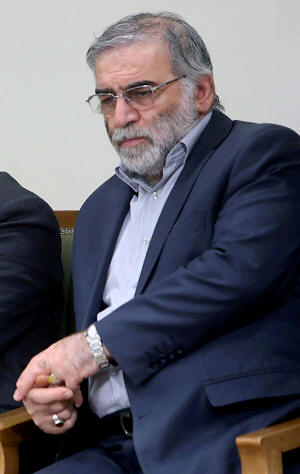Iran says 'smart satellite-controlled machine gun' killed top nuclear
scientist
 Send a link to a friend
Send a link to a friend
 [December 07, 2020]
DUBAI (Reuters) -The killing of
Iran's top nuclear scientist last month was carried out remotely with
artificial intelligence and a machine gun equipped with a
"satellite-controlled smart system", Tasnim news agency quoted a senior
commander as saying. [December 07, 2020]
DUBAI (Reuters) -The killing of
Iran's top nuclear scientist last month was carried out remotely with
artificial intelligence and a machine gun equipped with a
"satellite-controlled smart system", Tasnim news agency quoted a senior
commander as saying.
Iran has blamed Israel for the assassination of Mohsen Fakhrizadeh, who
was seen by Western intelligence services as the mastermind of a covert
Iranian programme to develop nuclear weapons capability. Tehran has long
denied any such ambition.
Israel has neither confirmed nor denied responsibility for the killing,
and one of its officials suggested that the Tasnim report of the tactics
used was a face-saving gambit by Iran.
In the past, however, Israel has acknowledged pursuing covert,
intelligence-gathering operations against the nuclear programme of its
arch-enemy.
The Islamic Republic has given contradictory details of Fakhrizadeh's
death in a daytime Nov. 27 ambush on his car on a highway near Tehran.
"No terrorists were present on the ground... Martyr Fakhrizadeh was
driving when a weapon, using an advanced camera, zoomed in on him,"
Tasnim, a semi-official agency, quoted Ali Fadavi, the deputy commander
of Iran's Revolutionary Guards, as saying in a ceremony on Sunday.
"The machine gun was placed on a pick-up truck and was controlled by a
satellite."

SECURITY GAPS
Fadavi spoke after Iranian authorities said they had found "clues about
the assassins", though they have yet to announce any arrests. Shortly
after Fakhrizadeh was killed, witnesses told state television that a
truck had exploded before a group of gunmen opened fire on his car.
Last week Ali Shamkhani, Secretary of the Supreme National Security
Council of Iran, said the killing was carried out with "electronic
devices" with no people on the ground.
Experts and officials told Reuters last week Fakhrizadeh's killing
exposed security gaps that suggest its security forces may have been
infiltrated and that the Islamic Republic was vulnerable to further
attacks.
[to top of second column]
|

Prominent Iranian scientist Mohsen Fakhrizadeh is seen in Iran in
this undated photo taken before his death. Official Khamenei
Website/WANA (West Asia News Agency)/Handout via REUTERS/File Photo

"Some 13 shots were fired at martyr Fakhrizadeh with a machine gun
controlled by satellite... During the operation artificial
intelligence and face recognition were used," Fadavi said. "His
wife, sitting 25 centimetres away from him in the same car, was not
injured."
Yoav Galant, an Israeli security cabinet minister, said he was "not
aware" of whether the remote-operated targeting technologies
described in the Iranian accounts existed.
"What I see is a great deal of embarassment on the Iranian side,"
Galant, a former naval commando and deputy chief of Israel's
military, told Army Radio. "It would appear that those who were
responsible for his (Fakhrizadeh's) security are now coming up with
reasons for not having fulfilled that mission."
Fakhrizadeh, identified by Israel as a prime player in what it says
is a continuing Iranian quest for a nuclear weapon, was the fifth
Iranian nuclear scientist killed in targeted attacks since 2010
inside Iran, and the second slaying of a high-ranking Iranian
official in 2020.
The commander of the Revolutionary Guards’ elite Quds Force, Qassem
Soleimani, was killed in a U.S. drone strike in Iraq in January.
Tehran retaliated by firing missiles at U.S. military targets in
Iraq.
(Writing by Parisa Hafezi and Dan WilliamsEditing by Mark Heinrich)
[© 2020 Thomson Reuters. All rights
reserved.] Copyright 2020 Reuters. All rights reserved. This material may not be published,
broadcast, rewritten or redistributed.
Thompson Reuters is solely responsible for this content. |